
Honduras is a country in Central America. Honduras borders the Caribbean Sea and the North Pacific Ocean. Guatemala lies to the west, Nicaragua south east and El Salvador to the south west. Honduras is the second largest Central American republic, with a total area of 112,890 square kilometres (43,590 sq mi).
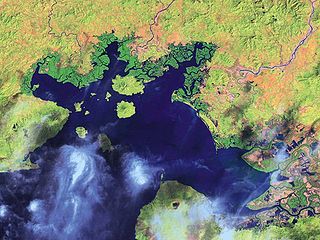
The Gulf of Fonseca, part of the Pacific Ocean, is a gulf on Central America, bordering El Salvador, Honduras, and Nicaragua.
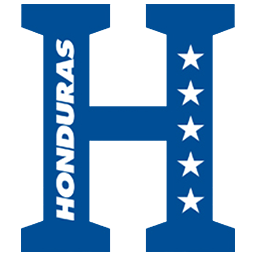
The Honduras national football team nicknamed Los Catrachos, La Bicolor or La H, is governed by the Federación Nacional Autónoma de Fútbol de Honduras (FENAFUTH). To date, the team has qualified three times for the FIFA World Cup, in 1982, 2010 and 2014.
Aguas Santas Ocaña Navarro was the first lady of Honduras. Aguas Santas, her double given name, means "holy waters" in Spanish.

The municipality of El Progreso is located in the Honduran department of Yoro.
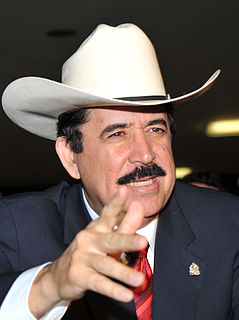
José Manuel Zelaya Rosales is a Honduran politician who was President of Honduras from 27 January 2006 until 28 June 2009. He is the eldest son of a wealthy businessman, and inherited his father's nickname "Mel". Before entering politics he was involved in his family's logging and timber businesses.
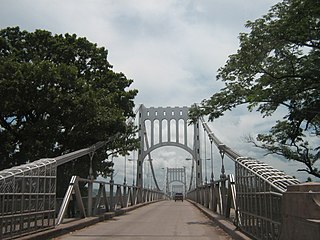
Choluteca is a municipality and the capital city of the Honduran department of the same name. Situated in southern Honduras between El Salvador and Nicaragua, the city is generally considered the regional centre of southern Honduras and is a major transit point on the Pan-American Highway. It has a major bus station and is home to the regional light (ENEE) and water (SANAA) utilities. The city is located on the Choluteca River, near the centre of the department. An arching silver bridge crosses the river into the city.
José Eduardo Bennett is a retired Honduran footballer. He is currently manager of UPNFM.
Diego Vigil Cocaña was a Central American politician. He was the last president of the Federal Republic of Central America (1839–40), during its disintegration. He was also chief of state of the federal states of Honduras (1829) and El Salvador.
The 1981 CONCACAF Championship, the eighth edition of the CONCACAF Championship, was held in Honduras from 1 November to 22 November. All games were played in the Estadio Tiburcio Carías Andino in Tegucigalpa. This tournament was won by the host, Honduras, who earned their first title and secured for the first time a place in the FIFA World Cup, as the tournament also served as qualification to Spain 1982. The North, Central American and Caribbean zone was allocated two places in the final tournament. This edition was marked by an upset as Mexico, traditional CONCACAF heavyweights and needing a win to go through, were eliminated by Honduras. The 0–0 tie between Mexico and Honduras qualified El Salvador to participate in the World Cup as the CONCACAF runners-up. El Salvador also became the first Central American team to qualify for more than one World Cup. This would be the last tournament which would feature a host nation for the final round.

Luis Alfredo Ramírez Quioto, nicknamed El Bombero, is a Honduran football striker who currently plays for Deportes Savio in the Honduran national league. He is nicknamed Bombero because he used to work at a gas station as a gas pump attendant.
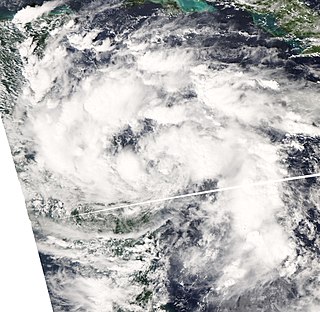
The October 2008 Central America floods were caused by a series of low-pressure areas including Tropical Depression Sixteen, a short-lived tropical cyclone in the 2008 Atlantic hurricane season that made landfall in Honduras. Heavy rainfall began in early October 2008 while a tropical wave passed through the region. On October 14, Tropical Depression Sixteen formed just off the northeast coast of Honduras, and at the same time a low pressure system was on the Pacific coast. Both systems increased rainfall across the region, although the depression dropped heavy rainfall close to its center when it moved ashore on October 15. Although Tropical Depression Sixteen quickly dissipated over land, its remnants persisted for several days. Another low pressure area interacted with a cold front on October 21, adding to the rainfall in the region.
Temporary protected status is a temporary status given to eligible nationals of designated countries who are present in the United States. The status, afforded to nationals from some countries affected by armed conflict or natural disaster, allows persons to live and work in the United States for limited times. Currently, persons from ten countries—Haiti, El Salvador, Syria, Nepal, Honduras, Yemen, Somalia, Sudan, Nicaragua; and South Sudan—have temporary protected status. About 320,000 people have TPS as of 2017, the majority from El Salvador (195,000), Honduras (57,000), and Haiti (46,000).
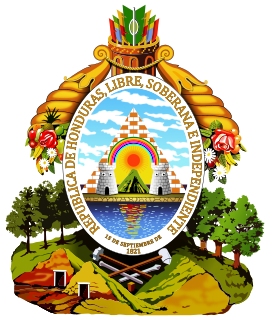
The 2009 Honduran constitutional crisis was a political dispute over plans to either rewrite the Constitution of Honduras or write a new one.

The 2009 Honduran coup d'état, part of the 2009 Honduran constitutional crisis, occurred when the Honduran Army on June 28, 2009 followed orders from the Honduran Supreme Court to oust President Manuel Zelaya and send him into exile. Zelaya had attempted to schedule a non-binding poll on holding a referendum on convening a constituent assembly to rewrite the constitution. Zelaya refused to comply with court orders to cease, and the Honduran Supreme Court issued a secret warrant for his arrest dated 26 June. Two days later, Honduran soldiers stormed the president's house in the middle of the night and detained him, forestalling the poll. Instead of bringing him to trial, the army put him on a military aeroplane and flew him to Costa Rica. Later that day, after the reading of a resignation letter of disputed authenticity, the Honduran Congress voted to remove Zelaya from office, and appointed Speaker of Congress Roberto Micheletti, his constitutional successor, to replace him.

The effects of Hurricane Mitch in Honduras included the worst flooding in Honduras in the 20th century. Hurricane Mitch, the strongest storm of the 1998 Atlantic hurricane season, formed on October 22, and after becoming a Category 5 hurricane, it weakened and struck Honduras on October 29. While near peak intensity, Mitch struck the offshore Guanaja island, where it nearly destroyed the mangrove forest. On the mainland, the hurricane dropped torrential rainfall, and many gauges were washed away in mountainous areas where unofficial rainfall totals were as high as 1900 mm (75 in). The highest official total was 928 mm (36.5 in) at Choluteca in southern Honduras, which was more than half of the annual precipitation average there. The rains caused widespread flooding and landslides, although impact from winds was not as severe.











